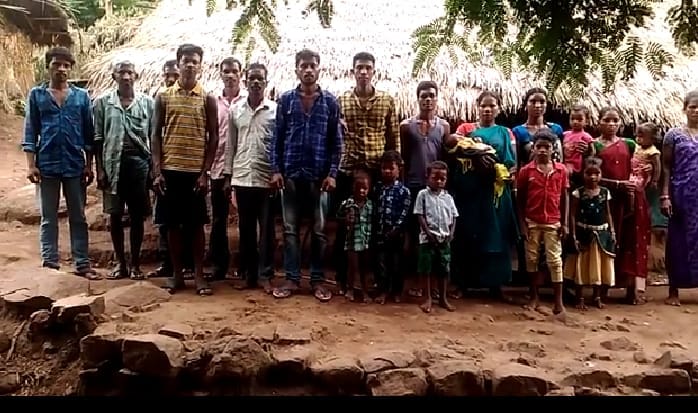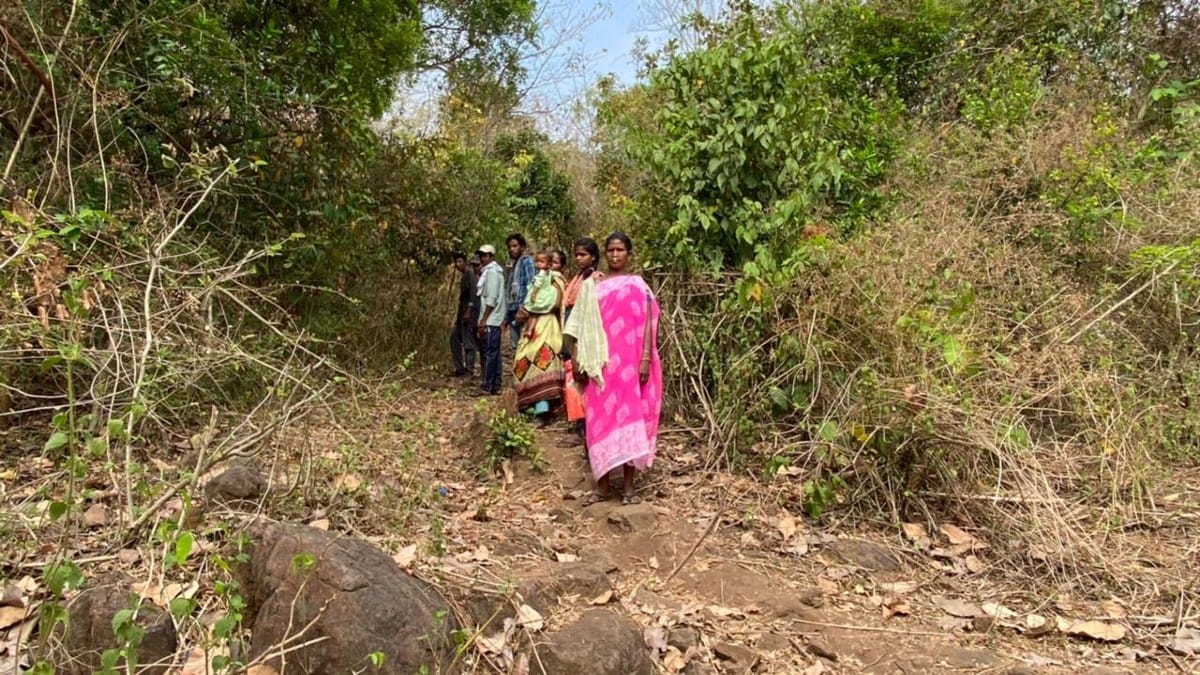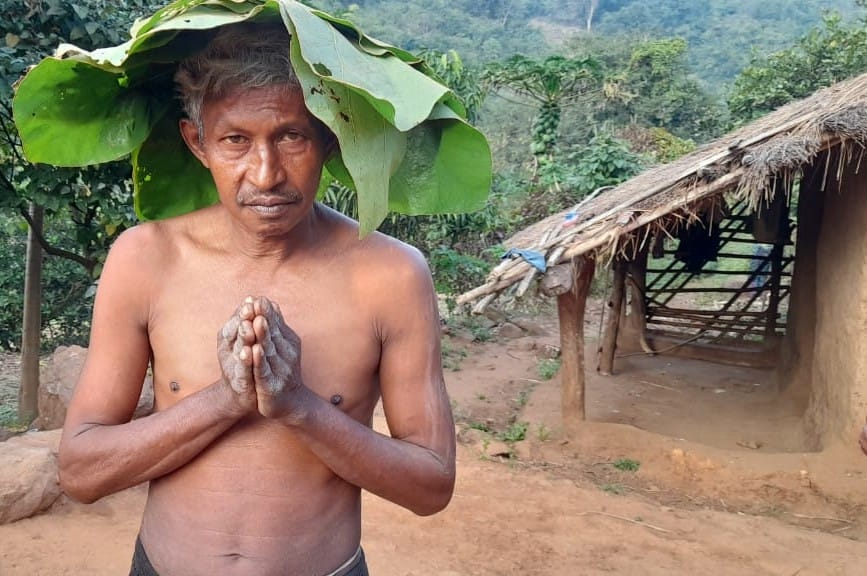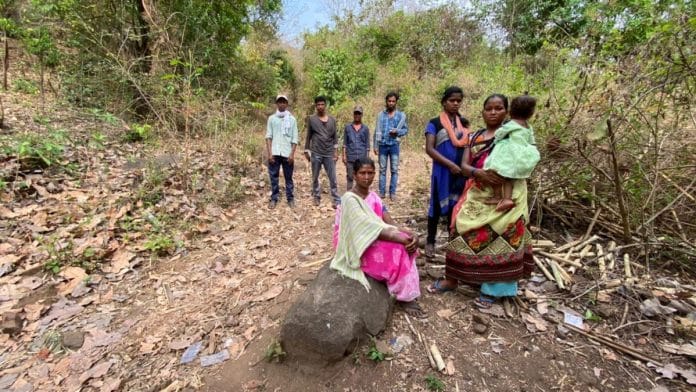Hyderabad/Jeelugulova: A three kilometre-long trek is the only way to reach Jeelugulova, a tiny hamlet in Andhra Pradesh. Nestled in the Eastern Ghats, this tribal village has no road connectivity, school or primary health care centre.
What’s more is that its inhabitants have no access to electricity. Some use solar plates, given to them by social workers, to charge their basic mobile phone or light a bulb in their makeshift huts, which villagers say are prone to flooding every time there is heavy rain.
Lack of access to these basic amenities is why residents of Jeelugulova – nine families comprising of roughly 50 members – are asking to be relocated. Of the 50 villagers, 10 are children and 20 are women.
The locals, who hail from the ‘Kondh’ tribe, depend on cashew cultivation to earn their daily bread. They also cultivate turmeric.

Residents of Jeelugulova did not even have Aadhaar cards till 2018 and all of them say they still do not have voter identity cards, for which they applied in 2020. “We have never voted in our lives,” 26-year-old Koraa Mahesh told ThePrint.
“We have been visiting the mandal revenue office for years now. The officials promised to relocate us to to get a road built but that never happened. We have protested and requested but nothing has worked till now,” he added.
Koraa Mahesh pointed out that it was due to hardships faced during the Covid-19 pandemic that Jeelugulova tribals are reiterating their demand to be relocated.
“We trekked downhill for a whole day only to realise everything is shut. People were confined to their homes and it was extremely difficult even to get groceries. And then there was the spread of Covid. We had to depend on social organisations who took care of us and sent us food. Only then we decided that we need phones to communicate with someone,” said Koraa Mahesh, recalling how the sudden lockdown made life extremely difficult for villagers in 2020.
Also Read: In Andhra, an uninhabited hill pits tribal women against local administration & mining firm
‘Doli’ stretchers, no school for kids
Each time there is a medical emergency, residents of the village are forced to carry the patient down the hill to reach the nearest road before embarking on yet another journey to the nearest primary health care centre.
When ThePrint visited the primary health care centre in Kothakota in Ravikamatham mandal, it was shut.
This is why irrespective of age, the one skill every single villager in Jeelugulova is taught is how to tie a ‘doli’ – a makeshift stretcher made by tying pieces of wood together with rope.
“The challenge is to trek down to the road carrying these dolis. We usually depend on natural/plant medicine if we fall ill, only if it is an extreme emergency do we decide to trek down. Otherwise, it is a task to do that every time. Even to get our basic ration, we have to trek down 3 kilometres,” 39-year-old Balaraju told ThePrint.
Over the years, multiple instances have come to light of pregnant women in several such ‘road-less’ villages in Andhra Pradesh being carried to the nearest hospital in these ‘dolis’ after they go into labour .
Chilakamma (55) has helped at least seven women who could not be taken to the nearest health care centre deliver their babies. “What option do we have? It is risky both for the mother and the baby if they are carried down the hills in a doli,” she said.

The circumstances are no different for the children of Jeelugulova, all aged below 10, who never went to school. The five teenagers living in this ‘doli’ village have also never seen the inside of a classroom.
“Our children cannot trek down every time to go to school. Had there been road connectivity, they would have walked and went to school. After pleading with the authorities for years, now once a month the children are taken down to Anganwadi for their health check up,” said Balaraju.
Missing from records
Considered a part of Visakhapatnam’s Ravikamatham mandal until 2011 (year of the last Census), Jeelugulova was removed from the list of settlements under Ravikamatham mandal that same year. Ravikamatham, a non-scheduled mandal, is counted a part of Anakapalle district post the reorganisation of Andhra Pradesh’s districts in April this year.
“It was considered there was no such habitation in Jeelugulova and it was removed from the list,” mandal revenue officer Kanaka Rao told ThePrint.
“The irony is that there are no records showing which mandal Jeelugulova falls under. It was removed from Ravikamatham mandal, although it is situated in Somalamma hills for which mining permissions are issued through Ravikamatham mandal office only,” said Govind Rao, a member of Andhra Pradesh-based Girijana Sangham, an organisation working for tribal rights.
He added that residents of Jeelugulova were listed as tribes in need of relocation and rehabilitation under the Scheduled Tribes and Other Traditional Forest Dwellers (Recognition of Forest Rights) Rules, 2008, but life hasn’t changed for them since.
“We provided them with a solar plate and got some bulbs fitted. They charge their basic mobile phones using the same and their battery lasts barely a few hours. They call us in the case of an emergency. After much coordination, we could get Aadhar cards made for them with the help of local officials. These people have been living in the village for at least 35 years. A few migrated but the rest of the families are still there,” Govind Rao told ThePrint.
‘Proposal to include it in Fifth Schedule’
With nine offices in Andhra Pradesh, the Integrated Tribal Development Agency (ITDA) keeps track of such villages that have no road connectivity. The ITDA’s Paderu division, of which Gopala Krishna is project officer, has 972 such tribal villages in 11 mandals but Jeelugulova is not counted among them.
“Jeelugulova has been under our notice and I had even asked for estimates on an Anganwadi, school and road connectivity. There is also a proposal to include Jeelugulova in the Fifth Schedule, and there are proposals from 93 Gram Panchayats,” Gopala Krishna told ThePrint.
The Fifth Schedule of the Constitution deals with the administration and control of areas where Scheduled Tribes are in a majority.

“Jeelugulova does not feature in the list of 972 villages as it is situated in a non-scheduled area, unlike others. The list of villages with no road connectivity in non-scheduled areas is in the hundreds which the officials have no count of. They don’t even recognise the existence of these villages; officials have no idea where these villages are or who stays in them,” activist Govind Rao said.
Asked about what the agency hopes to do for the Jeelugulova tribals, ITDA Paderu project officer Gopala Krishna said, “The sanctions for schools have not come yet, and I am yet to receive a report on possible road connectivity. Also, we are in the process of surveying if this habitation falls under Ravikamatham mandal or G. Madugula mandal.”
“We launched Mission Paderu Connect in December to help provide connectivity to these mandals,” he said, adding that this initiative focuses on providing roads, internet, drinking water and electricity.
“We hope to achieve that in the next three years, maybe,” he told ThePrint.
When ThePrint reached out to revenue officials of Ravikamatham, G. Madugula and V. Madugula mandals, they responded by saying that Jeelugulova does not come under their respective juridictions. The Anakapalle District Collector, Ravi Prakash Shetty, did not respond to ThePrint’s calls or text until the time of publishing of this report.
(Edited by Amrtansh Arora)
Also Read: From first seeds sown by traders to tribals’ cash crop: How Andhra became a ganja hub






